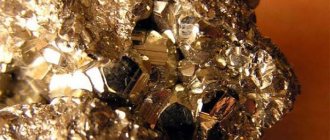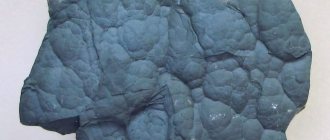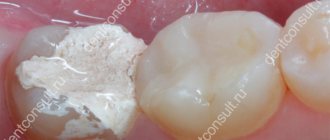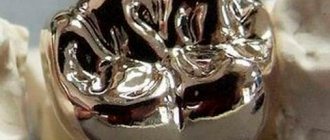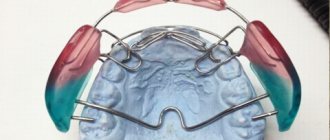Randol (beryllium bronze) is an alloy of copper with beryllium (BeCu), and sometimes other alloying elements. The chemical composition is 97% copper and 0.5 to 3% beryllium. Externally it resembles gold. Randol is also called “gypsy” or “samovar” gold, as the alloy was often used to make counterfeit jewelry.
Beryllium bronze was discovered by the American company Little Falls Alloys Corp in 1943. Since its commercial introduction, it has been used for the production of spring wire.
The alloy combines high strength (not inferior to many types of steel), non-magnetic properties, elasticity, corrosion resistance, good electrical (slightly inferior to copper) and thermal conductivity, as well as low plastic deformation. Randole lends itself well to cold drawing, is quite plastic, can be easily machined and formed, and is used for the manufacture of special metalworking tools used in explosive environments (there is no sparking during impacts), as well as musical instruments, precision measuring devices, bullets and aerospace instruments.
Randole can be forged, welded and cut, and is resistant to non-oxidizing acids (for example, hydrochloric or carbon), plastic decomposition products, as well as abrasive wear and abrasion. The alloy can be heat treated to improve strength, toughness and electrical conductivity. Thus, randole achieves the highest strength among all other copper alloys.
Beryllium bronze is produced in the form of round, square, flat or shaped wire in coils, coils and straight sections.
Randol metal. Properties of randol. Application of randoli
Properties of randoli
randol its main, and, most importantly, legal application in industry. It has a unique property.
All alloys “age.” Over time, their strength decreases. With beryl bronze the opposite is true.
The material only becomes “steadier” over the years. This quality of the alloy is used in the aviation industry.
A large passenger liner contains at least a thousand randoll items .
Consumers of the mixture of copper and beryllium are the automotive industry and the electrical engineering industry.
Randol alloy is used for springs, springs, shock absorbers, bearings and more.
The anti-magnetic, wear-resistant properties of bronze come in handy. In addition, the material does not spark when struck.
The alloy with beryllium is resistant to heat, therefore it is used in sliding bearings. These are pipeline elements.
It supports the segments in a vertical plane. The element is movable. It rubs against adjacent metal parts, heating up.
If there were another alloy in place of beryl bronze, neighboring elements would begin to penetrate each other and grind down.
Gypsy gold is a material for drilling rigs. Randol allows them to “bite into” any rock of the earth’s crust without deforming or breaking.
Randol , composition is filled with beryllium by more than 3 percent, loses its unique properties.
The ideal balance is achieved with 88 percent copper and 2 percent beryllium. In its pure form it cannot be processed and is not plastic.
Bronze with it can be drawn into wire one tenth of a millimeter thick.
The volume of global consumption of beryl bronzes is 30 thousand tons per year. These are the data of the analytical agency Roskill.
Randoli price
Some manufacturers charge more than a thousand rubles for just 100 grams of metal.
This is the process of removing small chips from the surface of an alloy. This is necessary to give the semi-finished product the desired shape. The technology is reminiscent of processing wood with a plane.
Randoli production
The standards for the production of domestic and foreign beryl bronzes vary.
Only semi-finished products produced by the Moscow Non-Ferrous Metals Processing Plant meet international criteria.
The remaining Russian enterprises are still operating according to GOST 1789-70 approved in the USSR.
There are indicators from 11 to 16 percent, from 21 to 26, and 29 percent. For comparison, domestic hard beryl bronzes, designated by the letter “H,” are deformed by 30, 40 percent. Soft samples (letter “A”) do not change at all.
Deformation increases the strength of the alloy. It is carried out after hardening, that is, strong heating followed by sharp cooling.
The properties of bronze improve only if it is changed in a cooled state.
on the degree of this change, and hence the final strength of the randole .
Application of randoli
Consumers do not want to overpay for an alloy with 40% indicators if they are not purchasing it for nuclear reactors and missiles.
Jewelry made from randole alloy , for example, does not need to be deformed. A soft composition is suitable for jewelry making.
True, they are called prison ones because such “implants” are used in prison zones.
Prisoners are treated free of charge; it is not profitable to give them crowns made from more expensive materials.
Randole teeth often do not take root and cause allergic reactions, but prison inmates have nowhere to go.
They do not fade over time, unlike products made from other types of bronze. They even make coins from randol, although only decorative ones.
Source
Do periodontal teeth need to be removed?
Modern medicine has many methods to avoid the removal of periodontal teeth. The conservative treatment regimen for periodontal disease includes:
- professional dental cleaning;
- drug therapy (vitamin complexes, immunomodulators);
- physiotherapeutic procedures (diadynamic therapy, darsonval, massage);
- laser therapy;
- rinsing the mouth with strong green tea, water infusions of lingonberry and blackberry leaves, calendula flowers, kombucha, oak bark;
- applications based on sea buckthorn oil;
- splinting.
With advanced periodontal disease, the patient may be recommended surgical intervention. During the operation, the doctor builds up atrophied bone and other periodontal tissues, removes subgingival granulations, and takes measures aimed at accelerating regenerative processes (uses platelet-derived growth factor, fibroblasts, stem cells, etc.). Removal of periodontal teeth is performed only in extreme cases if there are appropriate indications.
Indications for tooth extraction for periodontal disease
Removal of periodontal teeth is performed only if the following reasons exist:
- tooth roots are exposed by 4 mm or more;
- there are no interdental gingival papillae;
- bone tissue atrophies by 2/3 of the length of the tooth root or more;
- Due to the divergence of teeth and changes in their position in the oral cavity, the bite is significantly disturbed.
In some cases, extraction for periodontal disease is carried out at the request of the patient.
What it is
Gypsy gold is not a precious metal , as it is a cheap alloy. The composition of gypsy gold (also called “randol alloy”) includes copper and beryllium, and therefore cannot be called a noble metal. The correct name for this material is beryllium bronze .
Another variety is tombak , consisting of copper and zinc. In past centuries, this was a sought-after material. It was invented back in the 17th century and became widespread throughout the world.
It is noteworthy that already in those days, scammers passed off coins and jewelry made from this alloy for gold
Depending on the zinc content, the alloy changes color from yellow to red. Externally, it is almost impossible to distinguish it from gold. It has anti-corrosion properties, ductility, and wear resistance. It can be easily forged, engraved, and gilded, so it was in demand in the samovar making industry.
As for the combination of copper and beryllium, it is a material with good technical characteristics, so the legal uses of randoli are varied. Beryllium bronze has a unique feature: while other alloys “age” and wear out over time, this does not happen with this material.
Randol is widely used, for example, in the production of aircraft, in the automotive industry and other industries. The alloy is resistant to heat, wear-resistant, does not deform, and is resistant to corrosion. In addition, beryllium bronze has properties that make it suitable for making decorative items, accessories (for example, watch bracelets), and knife blades. They make jewelry from it because it has a beautiful color and is malleable for various types of processing. However, over time it oxidizes and loses its shine.
Randol in jewelry
Surely each of us has heard the term “gypsy gold”. What it is? This is the second name for Randoli. Considering that this alloy is very similar in appearance to gold, nomadic people make jewelry from it. They cannot be called jewelry, since the composition of these products does not include expensive materials.
But still, gold randol is used for making:
- Wide range of jewelry products.
- Watch bracelets.
- Decorative items for interior decoration.
Moreover, in prison clinics Randol is used to make crowns. And although such elements do not take root and often cause allergic reactions, prisoners have to agree to their installation.
Where else is Randol alloy used? This metal is used to make decorative coins, badges, and medals. In appearance, the mixture of copper and beryllium resembles 375 gold metal. However, according to experienced jewelers, it is more difficult to make jewelry from it than from precious material.
Why is randole called “gypsy gold”
Products made from a mixture of beryllium and copper are similar in appearance to gold, so large earrings, rings, and necklaces, traditionally worn by the gypsy people, were sold at fairs under the guise of jewelry.
Such jewelry has a right to exist, like any other jewelry, but the buyer must be warned about what he is actually buying.
Unfortunately, beryllium bronze was often sold as gold, which it has nothing to do with.
Therefore, the price of gypsy gold should be lower than the cost of the original precious metal.
Moreover, the gypsies learned to make even cheaper analogues, replacing beryllium with chromium or nickel. Such jewelry sparkled only at first, but then quickly faded and oxidized.
Randol:
Randol is an alloy of copper (Cu) (97%) with beryllium (Be) (0.5-3%) with various additions of other metals (nickel, chromium, magnesium). This alloy is also known as beryllium bronze and “gypsy gold”. In appearance it is similar and indistinguishable from gold.
Randole is used for the manufacture of metalworking tools that can be safely used in environments containing explosive gases, for the manufacture of jewelry for imitation gold purposes, for the manufacture of springs, spring wires, load cells and other structural elements that must retain their shape over periods cyclic compression and stretching, for the manufacture of aerospace devices, etc.
How to distinguish randole from gold
There are several ways that allow you to understand that what you have in front of you is a painted alloy or gold. Of course, the most reliable way is to shop in trusted jewelry stores, where you can be sure of the quality of the jewelry.
How can you verify the authenticity of a product without special equipment?
Check the sample
First of all, find a print that shows the percentage of pure precious metal in the alloy. The most common standard is 585, the highest is 999 (this is bank metal, not jewelry). You can use a magnifying glass to examine the mark.
Inspect the joints
If you have a chain or bracelet in front of you, look at the joints. There is usually a slight difference between the color of the metal and the joint: when soldering gold, jewelers use a higher grade metal at the joint because it melts easily.
Use a magnet
A magnet will allow you to distinguish a piece of jewelry from a fake. The best magnets are iron, nickel, and cobalt. Apply a magnet to the jewelry: if it sticks, then it is either a fake or gold of the lowest standard with a large number of impurities.
Thus, randole is a technical material that is widely used in various industries. In past centuries, samovars were made from it. It has nothing to do with jewelry.
Source
Grow new ones
I heard that scientists will soon learn to grow new teeth to replace the ones that have fallen out. Are such developments being carried out in Russia? And when will this technology be used?
Alla, Tolyatti
– Such technologies already exist. For example, in 2006–2007, Japanese scientists managed to grow the rudiments of permanent teeth in rats. And last year, Russian scientists repeated this experiment. The material for growing teeth is stem cells, which can be taken from various tissues - adipose and others. For example, Russian scientists have patented a technology for obtaining stem cells from the tissues of human milk teeth. That is, after a baby tooth is removed, stem cells can be isolated from it, frozen, and subsequently used to grow a new tooth. The germ of such a tooth is transplanted into the socket of the extracted tooth or into the socket formed by the surgeon. This technology is currently being tested in many countries, and, according to experts, it may become widely practiced within the next 50 years.
Caries will lead to a stroke. What are the dangers of untreated teeth Read more
General information about metal
The randol alloy contains copper and beryllium; these are the main components that determine the composition of bronze called randol. The metal also has another, not so euphonious name - “gypsy gold”. As you know, gypsies are a nomadic people, and blacksmithing has a special honor among them, and not only because horses need to be shoed. Gypsy blacksmiths are excellent at handling the entire cycle of metallurgy - from ore mining to manufacturing the final product. So, creating an alloy similar in appearance to gold from copper and beryllium is not a problem for them. That is why randol received such an unflattering nickname.
But the alloy is used not only in costume jewelry and jewelry making. Due to its high mechanical properties, the metal is actively used in industry and technology. High tensile strength has made the metal an essential component in the manufacture of aircraft and ships. By the way, this indicator for randoli is higher than for high-alloy steels, although it is cheaper to produce. Another unique property is the gradual increase in strength. While most steels and alloys age over time and lose their properties, randole, on the contrary, only gains strength. Over time, beryllium bronze only strengthens its characteristics. This is one of the key qualities of using an alloy in the design of aircraft landing gear, individual load-bearing elements of an aircraft airframe. On average, each liner has up to a thousand parts made of metal.
What does randole look like?
The alloy is also indispensable in the automotive industry. Engine parts, individual components of the hydraulic system, and the brake system of a car cannot do without metal, which can withstand almost three times greater loads than steel.
High-tech sectors of the economy, such as nuclear energy, cannot do without the alloy - the simplest, and at the same time responsible use of metal for hand tools. Randol does not magnetize or spark, which is very important when working in an explosive environment.
Composition and properties
The alloy contains copper and beryllium. At the same time, the maximum concentration of beryllium in the alloy is only 3%, and these percentages are enough for bronze to have exceptional properties.
Beryllium is a very strong, but at the same time brittle metal. In its pure form, it is capable of cutting the strongest rocks and high-alloy steel, but it breaks when dropped from a meter height. Therefore, in bronze its content should be no more than 3 percent. The classic randole used in casting has 88 shares of copper and only 2 parts of beryllium. This alloy is very strong and very difficult to machine. The fact that randole has exceptional tensile strength is evidenced by the fact that foil with a thickness of only 1/10 millimeters can be pulled out of it.
Randole has ductility and is often used in springs and leaf springs. It does not react with oxygen, which makes it one of the most popular materials among sculptors and architects.
High strength and difficulty in machining allow the metal to be used in bearings and rolling bearings.
Randol is not magnetic; this property is actively used in electrical engineering. The housings of compasses and gyroscopes are made of metal. Randoliium parts are used in the manufacture of artificial satellites and spacecraft.
The metal is not prone to expansion at high temperatures; pipeline elements are often made from it, including for the chemical industry.
Randole is used in the production of pipelines
But most importantly, when interacting with other parts, it is not subject to diffusion, which allows it to be used in the most important units and parts.
Application[
An example of a non-sparking beryllium bronze tool. Beryllium bronze is a non-ferrous alloy used in springs, spring wires, load cells and other parts that must maintain their shape under repeated stress and deformation. It has high electrical conductivity and is used in low current battery contacts and electrical connectors.
Non-sparking, yet durable and non-magnetic, beryllium bronze meets the requirements of the ATEX directive for zones 0, 1 and 2. Beryllium bronze screwdrivers, pliers, wrenches, chisels, knives, and hammers are suitable for work around explosive substances, such as on drilling rigs , coal mines and grain elevators. Another alloy sometimes used to make non-sparking tools is aluminum bronze. Compared to steel tools, beryllium bronze tools are more expensive to manufacture and lack strength and durability, but the advantages of beryllium bronze in hazardous environments may outweigh the disadvantages.
Beryllium bronze is also used to produce:
- certain percussion instruments for their consistent tone and resonance, especially tambourines and triangles;
- cryogenic equipment used at very low temperatures, such as dilution refrigerators, due to the mechanical strength and relatively high thermal conductivity of this alloy in this temperature range;
- armor-piercing bullets[2], although this use is unusual because steel bullets are much cheaper and have similar properties;
- packings used to create an RF-tight (radio frequency leakage resistant), electronic seal on doors used in electromagnetic compatibility testing and anechoic chambers.
Beryllium bronze wire[3] is available in several forms: round, square, flat and shaped, in coils, in coils and in straight sections.
Scope of application
Having such unique properties, randol is often used in the most unusual pieces of equipment. As already mentioned, randole is used in the electrical industry. Bronze elements of relays and contact group assemblies, springs and clamps, without all this it would be impossible to electrify and ensure the normal functioning of entire regions.
For railways, beryllium bronze is a truly strategic resource - from wheel bearings to electrical components of electric locomotives and switches, randol is needed everywhere.
Modern shipbuilding is impossible without the use of randol. At the same time, not only civilian, but also military, especially for the nuclear fleet. Many parts of power plants of surface and underwater ships are equipped with randolium pipelines, and the housings of sensors and instruments are made of metal. After all, metal is not only difficult to machine, it does not oxidize and is not subject to aging, which is very important in such conditions.
Beryllium bronze is the main material for the manufacture of drilling tools. It is the randole that is used as a head into which diamonds are inserted for drilling deep wells.
Randol alloy price
To understand why a gram of alloy has such a price, you need to understand what the metal is intended for. Scrap metal as part of jewelry or leftover equipment will be inexpensive, usually buyers give 40-60 rubles per gram for it, it depends on the amount of metal. When purchasing metal in the form of industrial blanks, it can cost about 400-500 rubles per 1 gram of metal. For jewelry workshops, the alloy is offered in rods, ingots, plates and granules for remelting. The price of such metal is about 700 rubles per gram. It’s easy to find out how much metal for dentistry costs - the price starts from 1000 rubles.
The price of Randol is 400-500 rubles per 1 gram of metal
The most expensive is randol containing lead - this bronze not only lends itself well to machining, it is also excellent for forging. The price of such metal starts from 1,500 rubles per gram.
Unfortunately, the production of beryllium bronzes in Russia today does not meet international standards. In the country, only the Moscow Nonferrous Metal Plant produces products that meet some international standards for beryllium bronze.
Source
What is Randol and what is its composition?
Jewelry made from noble metal has always been highly valued not only for its beauty and brilliance, but also for its ability to maintain these properties over the centuries. Gold jewelry has always been a symbol of luxury, wealth, and prosperity, and therefore was in great demand.
High demand is a huge incentive for all kinds of scammers. The art of creating fakes developed along with the production of jewelry from precious metals and reached a fairly serious level.
The desire to buy an expensive thing for little money often only brings great disappointment. To avoid the bitterness of deception, you need to know a few simple ways to identify gold at home.
Different types of rondoli
We specialize in the production of round blind roundels (without hole) for the production of aluminum membrane tubes. Rondole is produced by stamping.
The degree of processing of the finished roundel
At the request of the customer, the roundel can be supplied with or without heat treatment, tumbled or not tumbled, with shot blasting and without additional processing.
Rondoli packaging
We pack the finished aluminum roundel in various types of packaging as agreed with the customer.
- corrugated boxes;
- big bags;
- other options at the request of the client
Rondoli supplies
Delivery of the finished roundel is carried out by various modes of transport as agreed with the client.
- cars (Euro trucks);
- Container Shipping;
- delivery of small quantities using transport companies by car or rail;
- other options at the request of the client
Visual inspection
The main method of determination without any available means is a thorough examination.
A good sign of quality is the mark of the manufacturer and the State Assay Service. The prints must be clear and even relative to each other, with the obligatory presence of a star or a woman in a kokoshnik. However. There is a common type of “jewelry” made of rondoli (beryllium bronze), which bears the Soviet mark of good quality.
Visually, the rondole is very difficult to distinguish from 583 gold. Fortunately, it is impossible to manufacture products with complex shapes from this material, so there are two types of such products: classic wedding rings and simple-shaped signets. Wedding rings made from copper alloys can be easily identified at home by two signs.
All you have to do is throw your wedding ring and the supposed fake onto a hard surface. The sound of gold is ringing, the sound of rondoli is dull. This method can be used at home for simple-shaped products made of any material.
Hardness
The hardness of the randoli is much higher. Upon careful inspection, the surface will be smooth; on softer gold, a large number of small scratches and abrasions will be noticeable. Signets made of rondoli, brass or bronze in most cases have a solid shape inside, without any embossing.
When purchasing chains or woven bracelets, special attention should be paid to such details.
The connecting ring between the lock and the chain must be sealed (solid). All chain links must also be soldered.
Which chain weave is the strongest?
You should also carefully examine the joints of the links for the presence of abrasions. In these places, the metal should not differ in color from other areas. The presence of spots of a different color is a sign of counterfeit on all products, not just on chains.
When choosing jewelry with stones, you need to carefully study their setting. Crooked inserts should raise suspicion. High-quality setting is a good sign of originality, since this operation requires a high level of skill. Also, during inspection, such an important factor as the quality of processing should not raise suspicion.
Quite often there are attempts to sell gold-plated products as gold. In jewelry production, gilding is applied to silver, and the hallmark is stamped according to the silver standard - 830, 875, 925, while on gold the numbers are different - 375, 583, 585, 750. The stamps also differ in shape. If there is no impression, the presence of the coating can be checked using such a basic tool as a nail file. Any coating is easy to damage. If you find metal of a different color on a cut, you can confidently say that the quality is poor.
A meticulous visual inspection is a very important psychological factor. The seller's reaction can help determine whether they are trying to deceive you or not.
Preparation and carrying out the procedure
The doctor must correctly diagnose the disease. To do this, a visual examination of the oral cavity is performed, followed by radiography. Before starting treatment, the patient must sign a document agreeing to undergo endodontic intervention.
A professional doctor must ensure that there are no contraindications, and special attention should be paid to the drug for pain relief. If the patient does not have accurate information about the presence or absence of an allergic reaction to a particular analgesic, then he is given a referral for an allergy test.
- Anesthesia.
- Protecting the diseased tooth from saliva. Ensuring sterility.
- Opening the dental cavity. Removal of dead hard tissue.
- cleaning . Removal of nerve endings.
- Filling canals with special mineral substances.
Difference from fake
Various metals can be yellow, not just gold. It may be difficult for a person who has not had experience working with valuable substances to distinguish a fake from real jewelry . When buying an expensive item, it is recommended to ask what real gold looks like and how to determine its authenticity.
Stamp and hallmark
Each gold product has a hallmark. You need to carefully examine it with a magnifying glass. The sample location on jewelry is determined by uniform worldwide requirements:
The hallmark is applied to the product in the form of numbers, for example, 585. Ordinary gold jewelry has exactly this hallmark. However, a hallmark with the numbers 999 will indicate pure gold without impurities. Everything below is alloys. The higher the standard, the more precious metal the product contains.
Appearance Features
The pronounced yellow color is a characteristic sign of authenticity. But this fact is not enough to determine whether it is a fake. For example, Turkish gold also has a rich yellow color. To check the quality of a gold product, you need to throw it on the table and listen to the sound:
Very often it is difficult to determine the authenticity of a gold item by appearance. Its color may vary depending on the subspecies. Alloys with the addition of less valuable metals give a golden color. Gold itself is not only yellow, but also red, pink, and white.
Chemical methods
There are several chemical ways to determine gold at home.
With iodine
When iodine is applied to gold, a brown stain remains. Copper alloys do not react to iodine. This method will take some time to use.
lapis pencil
You can buy a lapis pencil at a pharmacy. If you run it over a previously wetted surface, a mark will remain.
Nitric acid
If you need to test a lot of gold, then it makes sense to purchase a small amount of nitric acid. The method is very reliable. A drop of acid is applied to the product being tested using a glass or quartz rod. Gold 583, 585 will give a very weak reaction within 1 minute, leaving a light chestnut stain. A violent reaction will occur on the fake, with the formation of foam of a bluish or greenish tint, while the stain left by the acid will be almost invisible.
Checking using available tools
If you have any doubts about the authenticity of gold jewelry, it is recommended to check it using available means. Typically, vinegar, iodine or black bread are used for such purposes. In addition, there are a number of options that will help you distinguish gold from other metals yourself. This check can be done as follows:
Using a couple of these methods, you can make sure whether the jewelry is gold, copper or made of bronze.
How to determine whether gold is gold or not using a magnet
This method should only be used as an additional check. Not only precious metals, but also aluminum and copper will not react to a magnet. But scammers quite often use steel as an imitation of gold, especially white, to make chains and bracelets.
As experience shows, low-quality crafts are usually bought “in hand” or brought from vacation trips to exotic countries. The above methods for identifying gold at home will help you distinguish a valuable item from a fake with great accuracy and avoid disappointment.
Ways to identify gold
1) Previously, more radical methods were used, for example, the product was simply melted. This method is called the Crucible method and is not suitable for identifying counterfeits at home. Besides, after this you will only be left with metal.
2) Then they began to do an analysis using a special stone, acid and needles. The product and needles are passed over the stone, after which the resulting scratches are covered with acid and they are watched to see which of the stripes changes color. Depending on the color of such a strip, experts determine what the metal is made of.
3) If there is a product whose authenticity is beyond doubt, a comparative analysis can be carried out. Take two products and run them across a hard surface - if they both consist of the same gold alloy or gold of the same standard, then the mark from them will be the same. The method is not suitable for comparing products with different samples.
4) You can also use cosmetics for comparison. To do this, rub a small amount of foundation on the back of your hand. After the cream is absorbed, you can rub a gold item over it. A gray stripe will remain where the gold touches the foundation. If the product is made of brass, there will be no such stripe.
5) Such a common method in ancient times as testing gold items by tooth is still relevant today. The fact is that gold itself is a very soft metal, unlike brass. However, now an alloy is mainly used to make jewelry, where only a little more than half is gold, so it becomes somewhat more difficult to distinguish this composition. And yet, if you press it with your teeth, you can see a barely noticeable mark.
6) You can also identify brass jewelry using a ceramic plate. It is important that there is no glaze coating on it, only clean ceramics. If you run a gold item over it with slight pressure, a gold stripe will remain.
7) Nitric acid will help distinguish a gold product from a gold-plated one and from a fake one. If you place jewelry in a metal bowl and drop acid on it, then nothing will happen to real gold. The fake will change color to green, and the gold-plated metal will take on a milky hue.
Testing gold “to the point”
Clasp ceramic crowns
Bugel, translated from German, means “arc”. It forms the basis of a denture clasp prosthesis. It, in turn, is attached to special telescopic crowns that have a removable upper part. Since the lower part consists of permanent metal crowns, and the upper part itself is made of ceramic crowns. The load on the supporting teeth when wearing such dentures is small, which is their advantage. Clasp dentures do not need to be removed at night, all taste buds are preserved, they are very comfortable and durable to use. There are several different types and methods of installing clasp crowns. Our company offers the following:
- clasp ceramic crown Ducera;
- clasp ceramic crown Noritake;
- clasp cast crown.
Ceramic crowns can save your smile even when only the root remains of the tooth.
Ceramic crowns have:
- long service life;
- significant resemblance to real teeth;
- biocompatible properties with the oral cavity and dental tissues, that is, they will not cause any allergic reaction.
Randol alloy price
To understand why a gram of alloy has such a price, you need to understand what the metal is intended for. Scrap metal as part of jewelry or leftover equipment will be inexpensive, usually buyers give 40-60 rubles per gram for it, it depends on the amount of metal. When purchasing metal in the form of industrial blanks, it can cost about 400-500 rubles per 1 gram of metal. For jewelry workshops, the alloy is offered in rods, ingots, plates and granules for remelting. The price of such metal is about 700 rubles per gram. It’s easy to find out how much metal for dentistry costs - the price starts from 1000 rubles.
The price of Randol is 400-500 rubles per 1 gram of metal
The most expensive is randol containing lead - this bronze not only lends itself well to machining, it is also excellent for forging. The price of such metal starts from 1,500 rubles per gram.
Unfortunately, the production of beryllium bronzes in Russia today does not meet international standards. In the country, only the Moscow Nonferrous Metal Plant produces products that meet some international standards for beryllium bronze.
Stages of production and processing of aluminum roundel
Preparing metal in a mixer
Liquid metal of grade A7 is poured into the foundry mixer directly from the electrolysis bath. After filling the mixer, the slag and oxide film are removed from the metal surface. After settling (40 minutes), the metal is poured through a casting bath equipped with a ceramic foam filter (40 ppi).
Manufacturing of casting blanks
The filtered metal flows through the casting tray into the mold of the crystallizer. After cooling, liquid aluminum turns into a casting billet. The casting billet (t +360 ... +420) enters the rolling mill, where it is rolled to a certain size of a given thickness and wound into a roll weighing 500 - 700 kg.
Receipt of aluminum coils to the warehouse
After the rolls are accepted by the control department, they are taken to the finished product warehouse. From the warehouse, the tape is shipped to the consumer.
Round cutting process
The strip roll is installed in the unwinder and, through the straightening stand, is tucked into the cutting die located in the eccentric press.
After cutting, the roundel is accumulated in a storage box, and the cut metal is wound into rolls and stored on pallets of 5 pieces. and is supplied to metallurgical plants for remelting and obtaining new types of products.
The roundel from the box is poured onto the inspection table and, after a visual inspection, is poured into an intermediate tray, from which, after filling, it is transported and poured into the loading hopper of the washing, annealing and tumbling line.
Annealing the roundel
From the loading hopper, the rondole enters the transport chain of the annealing furnace (the width of the transport chain is 1 m 20 cm), where it is laid in a layer 4–6 pcs thick. At a speed of 10 cm/min, the rondole enters the first chamber of the shaft furnace (there are 3 chambers in total). After annealing, the rondole undergoes aging in the refrigerating chamber.
Tumbling and machining of roundel
After annealing, the elevator feeds the roundel into the machining unit. There, the process of friction of the rondoles against each other occurs during rotation in the drum, while the burr is removed and roughness is applied to the surface of the workpiece.
Rondoli packaging
Next, the rondole enters the storage hopper, after which it is packed into boxes. The boxes are placed on a pallet and, after receiving inspection, are wrapped with shrink film.
Second gold
In conditions of the economic crisis, many people purchase products from the so-called second gold. What it is? It is an alloy of Randoli and brass. Thanks to its attractive appearance, the material perfectly imitates gold, which is confirmed by the photo. Only a jeweler can distinguish an alloy from a real precious metal. Products made from this material are practically resistant to oxidation and rust.
Second gold has the following advantages:
Women really like the second gold. After all, purchasing products does not require a lot of money, and the result is amazing.
Biological moment
Often after having their ears pierced, women tend to immediately put on gold earrings. But if there are none, you can replace them with randoli earrings. Thanks to the special composition, products made from second gold are hypoallergenic. That is, when wearing earrings made of second gold, you don’t have to worry that your earlobes will swell and suppuration will appear. Gold jewelry does not cause negative side effects.
An experienced specialist will tell you more about the composition of the Randol alloy, as well as the methods of its use in the video.
Source
